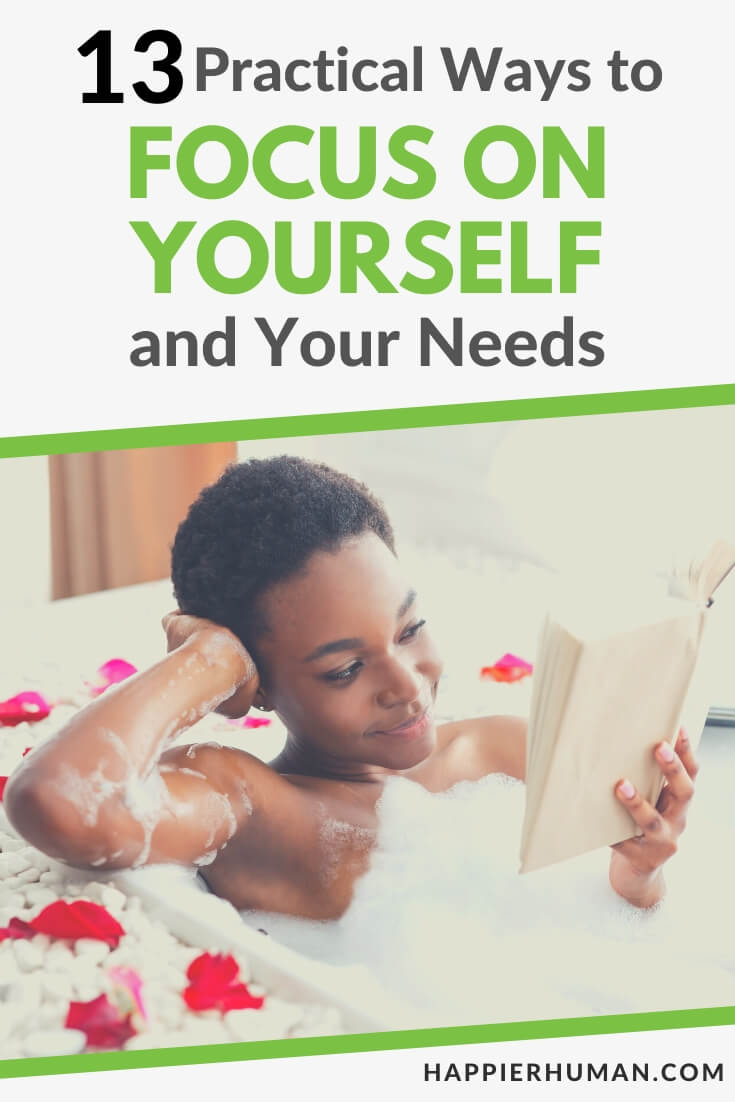“You can’t pour from an empty cup. Take care of yourself first.” ~ Norm Kelly
You are the cup, and when you continue to put others first and take care of everyone but yourself, you’ll find yourself much like an empty cup with nothing more to give.
There’s a reason why the airline hostess demonstrates putting an oxygen mask on yourself before you help your child, partner, or the person sitting next to you on a flight.
When you haven’t taken care of yourself, you can’t help others to the fullest of your ability.
That’s why it’s essential to put yourself first and prioritize your needs. And no, it’s definitely not selfish. It’s self-love, something you desperately need at this point.
But do you know how to focus on yourself?
It probably doesn’t come naturally or easily. But it can, provided you make it a habit and keep practicing to focus on yourself. Here’s how.
Why It’s Important to Focus on Yourself and Your Needs
Before I look at why it’s essential you focus on yourself and your needs, it’s critical to briefly cover what that means and what it looks like.
Focusing on yourself means that you put yourself first. You choose you. You make yourself a priority in your life, just like your family, friends, work, and your hobbies are important to you.
When you focus on yourself and take care of yourself – emotionally, spiritually, mentally, and physically – you become the best you that you can be.
Not a watered-down version who people-pleases and neglects themselves to be what others want and need.
You focus inward to give yourself what you need and what you are worthy of. You align your body, mind, heart, and soul to care for yourself. Why? Because you matter, and in the words of Maybelline, “you’re worth it.” (#100%True)
The benefits of focusing on yourself makes it clear that self-care should be a must in your life. Here’s why it’s important to focus on yourself:
13 Practical Ways to Focus on Yourself and Your Needs
Here are the best practical ways to focus on yourself and your needs:
1. Make Time for Yourself
You can't focus on yourself and your needs if you don’t make time for yourself. I get it. You’re busy so where are you going to just find or make time?
The good news is that taking care of yourself doesn’t require a full day at the spa every week. You need to find what works for you, but even taking five minutes two or three times a day can help replenish your cup.
You can play it by ear, but it’s best to actually schedule time in your calendar and set reminders so you can get in the habit of prioritizing yourself. Find solitude and ensure there are no distractions so you can just be.
Also, when you focus on yourself, it’s essential to nourish ALL of yourself: the physical, the emotional, the spiritual or inspirational, the occupational and intellectual, and the personal.
Make turns to take care of the parts of yourself that need it the most and don’t neglect the rest.
2. Set Boundaries and Learn How to Say No with Meaning
The easiest way to empty your cup and stay empty is to not have any boundaries. So do the opposite.
Learn how to set AND maintain boundaries that protect yourself, and two of the easiest ways to start enforcing boundaries are saying no and determining what you will allow (and what you won’t).
Boundaries aren’t walls; they simply remind you where the door is so only things that are good and people who are safe and healthy for you may enter.

Remember to be assertive when you say no, and you don’t have to please and explain or give reasons. No is a full sentence.
Together with saying no, boundaries draw a safe space around you so you can look after yourself and your needs.
And if someone has an issue with your new-found boundaries, they miss benefiting like when you didn’t have any boundaries (and that is a toxic relationship you should say no to).
Take time to decide what your boundaries are (and remember these aren’t set in stone). Clearly communicate these (which you’ll have to do repeatedly because other people mostly act in their self interest, not yours), and say no when you have to and need to.
And when you start protecting your energy and not wasting it (by not having boundaries), you help make space and time so you can focus on yourself.
3. Start Journaling
Journaling can help you discover who you are and take care of yourself. You can also learn how you truly feel about the things in your life, how to let go, and what you really need (aside from what other people need and external factors that have an influence).
Find the type of journaling that suits you, and set aside time to journal while you have your morning coffee, on your daily commute, or before you turn in.
Consider gratitude, bullet, junk, art, self-development, dream, religious, food, travel, structured, or letter journaling. You can free-write or use journaling prompts or ideas to inspire you, and buy a beautiful notebook and your choice of stationery or journal on your smart device.
You never have to share what you journal about with others. Your journal is there for your eyes and your eyes only so keep your journal safe and locked away if you need to.
4. Check In With Yourself
Another practical way you can focus on yourself is by regularly checking in with yourself. You need to pause, breathe, and listen to yourself.
Practicing mindfulness or meditation can help you tune into your true feelings, needs, and your intrinsic goodness – what makes you uniquely you.
You also need to practice listening to your intuition, paying attention to your emotions, and even talking (or venting) to someone you trust.
It’s only when you check in with yourself that you can identify what you need in that moment. The more you check in, the easier it’ll be to know what you need and meet that need.
5. Actively Choose You
When you focus on yourself, you need to actively choose yourself. Do what makes you happy, inspires you, and satisfies you.
It can be as simple as sitting under a tree, doing grounding, breathing in the fresh air, and feeling the grass underneath you.
Or, it can be watching a series you’ve been dying to see (even if you only watch 15 minutes of it a day), trying something new, or dancing in your kitchen.
Eliminate your sense of “should” (what you should do), and rather celebrate what you can do (what you are able to do). Believe what you do is enough because you are enough. Always.
Be mindful of what you are choosing when you are choosing you. Listen to your soul because it knows your true north and how you can best honor, value, and choose you. It’s freeing when you put your needs first and fall in love with yourself.
6. Get Acquainted With Your Inner Voice
A significant part of focusing on you is becoming acquainted with your inner voice, intrinsic goodness, or your highest self.
It’s who you truly are, and it’s only when you know your inner voice that you can learn who you are.
Start building a self-relationship to focus on you, know what you want out of life, and what you need to get there.

Gain self-knowledge by becoming your own friend and asking yourself these self-discovery questions. Identify your strengths and weaknesses and areas you’d like to develop in.
As you become familiar with your inner self, you gain a more complete picture of yourself without outside influences affecting your self-view.
7. Avoid False Self-Care
False self-care (also called faux self-care, fake self-care, or negative self-care) is a thing, and it’s something to avoid.
Fake self-care is the practice of doing self-care wrong or spending your energy on things that are actually bad or toxic for you.
Toxic self-care doesn’t help you take care of your needs, and the more you engage in bad self-care, the worse off you’ll be. Examples of faux self-care are:
Fake self-care also encompasses seeking loopholes or excuses to not engage in positive self-behavior. Examples of these loopholes I’m sure sound very familiar are:
Positive or healthy self-care should be choosing activities that help you replenish your energy, strength, passion, and joy. You shouldn’t do stuff that drains your energy (and no, negative self-care doesn’t truly bring you joy and definitely not in the long run).
8. Find Your Growing Edge
When you focus on yourself, you also need to work on your self-development or self-growth.
A significant aspect of that is finding your growing edge (or leading edge), which is the area(s) of your life where there’s room for improvement.
You need to work on your growing edge and nurture it. Identify an area in which you want to grow (a strength you want to strengthen) or a bleeding edge (weakness) you want to turn around and improve.
Your growing edge could be improving your communication skills, learning how to be more organized, working on your leadership skills, taking up a productive hobby to upskill your life, being more assertive, or growing your self-confidence.
9. Start with the Basics
It’s not easy to know what you need, especially when you’ve been putting yourself last and other people first for so long. You’ll be able to meet your exact needs after a lot of practice, so to make it easy, start with the basics.
Every person needs to eat, move, and sleep, so start there.
Go for a 10-minute walk every day (move), cut out fast foods from your diet (eat), and be sure to put your phone and TV off at least an hour before bed (sleep).
These simple lifestyle changes or additions will do you the world of good, and starting with the basics is how you start your journey to focus on you.
10. Get Professional Support
If you are struggling to meet your needs and feel lost with how to focus on yourself, get professional help. Reach out to a therapist, counselor, or life coach.
These professionals can give you the guidance and support you need, especially if you don’t have an inner circle of healthy individuals who want the best for you so you can thrive by taking care of yourself.
11. Create a Bucket List
To help you focus on yourself and get to know yourself again, create a bucket list with activities YOU want to do, not what you know or think your loved ones will want to do or will enjoy.
Your bucket list should be all about you. Think of hobbies and activities that excite you. Your list can contain stuff you’ve done and loved before and new items to get you out of your comfort zone and learning new skills (and what you are capable of).
While you make a bucket list, think of an anti-bucket list – a list of things you never want to do.
An anti-bucket list can be just as revealing as a bucket list and give you insight into yourself, which helps you meet your needs on a better and more accurate level.
12. Practice Self-Compassion
While you should love yourself and learn when to focus on yourself, practice self-kindness and self-compassion. Ideally, you should care for yourself as much as you care for others.
Being kind and compassionate toward loved ones and even strangers boosts your well-being and feelings of happiness, and this is just as true (if not more so) when you care for yourself.

Think about how you’d treat your best friend? Would you berate them for every mistake they make and every flaw they have? No, right? You’d be their biggest supporter and love them for who they are.
When you practice self-compassion, treat yourself as you’d treat that best friend – with love, support, and kindness.
Hug yourself when you need it, speak kind words to yourself, and take care of your needs with compassion.
I know we tend to be hardest on ourselves and become our own worst critic, but you are worthy of love, kindness, and compassion. So start practicing these positive and healthy behaviors with yourself.
13. Avoid the Comparison Trap
You can’t focus on yourself and what you need when you are constantly comparing yourself to others. And society makes it so easy to weigh up your successes and failures against those of your loved ones, colleagues, and strangers.
Social media is one of the biggest culprits because people only share what they want you to see – a supposedly perfect moment becomes seen as life.
It’s rare (and almost nonexistent) that a person is honest about who they authentically are and shares their struggles and challenges honestly.
Detox from social media to help you stop comparing yourself against other people.
Focus inward, and if you must compare, compare you against you. See how much you’ve grown and developed and how far you’ve come.
Using yourself as a comparison can help inspire and motivate you to do and be better.
Think about what brings you joy, what you have to be grateful for, and where you want to be in a year or ten.
Final Thoughts on How to Focus on Yourself
Society praises those who are selfless, noble, caring, generous, attentive, and forgiving, but these qualities are all about what we are and can do for others.
When you focus on yourself, it’s deemed as selfish, self-serving, and bad, especially if you are a woman.
But you can’t really be there for others if you aren’t there for yourself because you’ll only end up giving and giving more until you have nothing left, except for being an empty shell of a person.
It’s time to believe you are worthy and focus on yourself and your needs. It is a must.
So make time for yourself by actively choosing yourself, journal, avoid false self-care, regularly check in with yourself, and create and maintain boundaries.
If you struggle to love yourself, start with these 16 ways to love yourself more, or use these self-care checklists to help you take care of your needs every day.
And if you're looking for more articles on how to improve and love yourself, be sure to check out these blog posts:
- 9 Ways to Build a More Positive Self-Image of Yourself
- 71 Quotes About Always Loving Yourself First
- 35 Bible Verses About the Importance of Self-Love
Finally, if you want a simple way to reduce your stress and anxiety, then try writing these 35 mindfulness journaling prompts to live more in the present moment.


